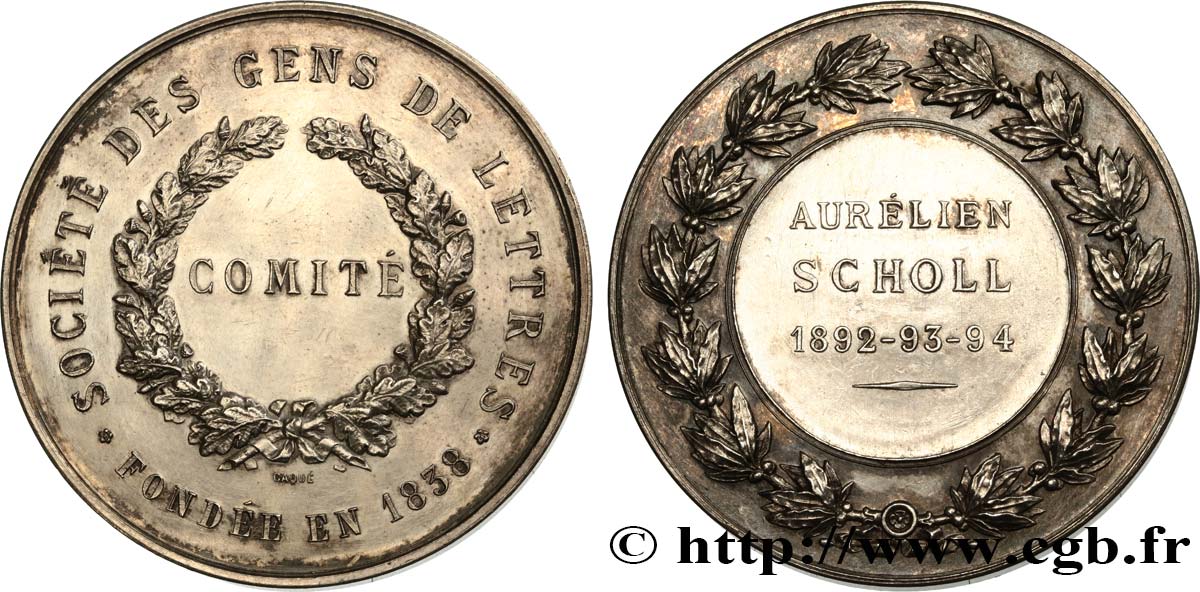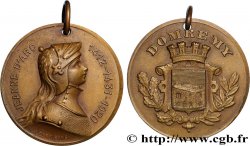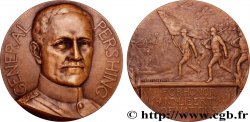E-auction 301-221058 - fme_370589 - III REPUBLIC Médaille du comité de la Société des gens de lettres
You must signin and be an approved bidder to bid, LOGIN TO BID. Accounts are subject to approval and the approval process takes place within 48 hours. Do not wait until the day a sale closes to register. Clicking on « bid » constitutes acceptance of the terms of use of cgb.fr private e-auctions.
Bids must be placed in whole Euro amounts only. The sale will start closing at the time stated on the item description; any bids received at the site after the closing time will not be executed. Transmission times may vary and bids could be rejected if you wait until the last second. For further information ckeck the E-auctions F.A.Q.
NO BUYER'S FEE.
NO BUYER'S FEE.
| Estimate : | 100 € |
| Price : | 21 € |
| Maximum bid : | 151 € |
| End of the sale : | 21 January 2019 18:18:00 |
| bidders : | 6 bidders |
Type : Médaille du comité de la Société des gens de lettres
Date: n.d.
Mint name / Town : 75 - Paris
Metal : silver
Diameter : 41,5 mm
Orientation dies : 12 h.
Engraver CAQUÉ Armand Auguste (1795-1881)
Weight : 38,5 g.
Edge : lisse + corne ARGENT
Coments on the condition:
Médaille en excellent état, avec une légère patine grise
Obverse
Obverse legend : SOCIÉTÉ DES GENS DE LETTRES - FONDÉE EN 1838 // COMITÉ.
Obverse description : Légende circulaire autour d’une couronne de chêne et COMITÉ au centre.
Reverse
Reverse legend : AURÉLIEN / SCHOLL/ 1892-93-94.
Reverse description : Légende en trois lignes dans un couronne de lauriers.
Commentary
La Société des gens de lettres de France (SGL, SGDL, SGDLF) a été fondée en 1838, sur une idée d'Honoré de Balzac, par Louis Desnoyers. C'est une association privée reconnue comme établissement d'utilité publique par décret en date du 10 décembre 1891.
Aurélien Scholl, né à Bordeaux le 14 juillet 1833 et mort à Paris le 16 avril 1902, est un journaliste, auteur dramatique, chroniqueur et romancier français. Dès l'âge de quinze ans, il publie dans L'Echo Rochelais des feuilletons en vers, d'inspiration socialisante. Venu à Paris en 1851, il collabore à divers journaux éphémères pour se fixer au Figaro de 1857 à 1861. Passé par d'autres rédactions, il finit par créer en 1863 Le Nain jaune qu'il pose en concurrent du Figaro et dans lequel il écrit sous le pseudonyme de Balthazar.
Un riche mariage contracté en 1866 avec la fille d'un riche brasseur de Londres, installe Scholl dans le Tout-Paris et lui permet de laisser libre cours à son humour cinglant. Ses articles agressifs lui firent de nombreux ennemis qui lui vaudront plusieurs duels, dont un avec Paul de Cassagnac qui le blessera grièvement.
Dans les années 1880, il collabore à La Justice de Clemenceau ; ils eurent l'un et l'autre comme maîtresse, la comédienne Léonide Leblanc (1842-1894), qui fut également celle du Prince Napoléon et du duc d'Aumale.
Il crée le Quotidien de Paris dont le premier numéro parait le 12 mars 1884. Il est rédacteur en chef mais confie la direction à Valentin Simond, plus tard directeur de L'Écho de Paris. Le journal durera jusqu'en 1938.
En 1896, le guide Paris-Parisien le considère comme le dernier des « chroniqueurs étincelants »..
Aurélien Scholl, né à Bordeaux le 14 juillet 1833 et mort à Paris le 16 avril 1902, est un journaliste, auteur dramatique, chroniqueur et romancier français. Dès l'âge de quinze ans, il publie dans L'Echo Rochelais des feuilletons en vers, d'inspiration socialisante. Venu à Paris en 1851, il collabore à divers journaux éphémères pour se fixer au Figaro de 1857 à 1861. Passé par d'autres rédactions, il finit par créer en 1863 Le Nain jaune qu'il pose en concurrent du Figaro et dans lequel il écrit sous le pseudonyme de Balthazar.
Un riche mariage contracté en 1866 avec la fille d'un riche brasseur de Londres, installe Scholl dans le Tout-Paris et lui permet de laisser libre cours à son humour cinglant. Ses articles agressifs lui firent de nombreux ennemis qui lui vaudront plusieurs duels, dont un avec Paul de Cassagnac qui le blessera grièvement.
Dans les années 1880, il collabore à La Justice de Clemenceau ; ils eurent l'un et l'autre comme maîtresse, la comédienne Léonide Leblanc (1842-1894), qui fut également celle du Prince Napoléon et du duc d'Aumale.
Il crée le Quotidien de Paris dont le premier numéro parait le 12 mars 1884. Il est rédacteur en chef mais confie la direction à Valentin Simond, plus tard directeur de L'Écho de Paris. Le journal durera jusqu'en 1938.
En 1896, le guide Paris-Parisien le considère comme le dernier des « chroniqueurs étincelants »..








 Report a mistake
Report a mistake Print the page
Print the page Share my selection
Share my selection Ask a question
Ask a question Consign / sell
Consign / sell
 Full data
Full data









